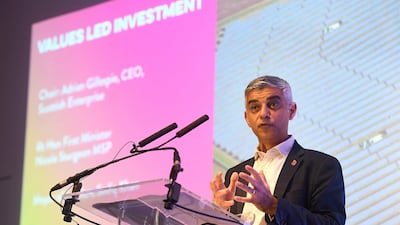London's mayor Sadiq Khan has said a decision to turn the city's Oxford Street shopping strip into a pedestrianised plaza will show how the UK capital is leading the charge to respond to climate change, as he spoke for global city bosses at the Cop26 conference.
After five years of accelerated reforms to building rules and transport systems in London, Mr Khan claims to have halved noxious emissions in the city. He wants his reformist approach to be adopted around the world, as the newly-installed leader of the C40 alliance of 100 mayors or metropolitan leaders.
He cited the example of the shopping strip in the West End of London, which has seen the introduction of electric bus services and bans on diesel vehicles, but said it would be a symbolic step to go further.
“I think Oxford Street should be pedestrianised. I think the future of retail is uncertain because of the big increase in online shopping and we have to make the experience of real in-person shopping a good one”, he said in Glasgow, as the Cop26 negotiations got under way in earnest.
A series of announcements by government leaders on deforestation and emissions featured in the first two days of Cop26, with the UK host hoping to keep alive the prospect set out in the Paris Agreement of restricting the rise in global temperatures to 1.5°C.
The C40 network of almost 100 cities across the planet accounts for one quarter of the global economy and all the members have adopted frameworks to achieve zero carbon. Mr Khan said city leaders were in many cases better placed than states to deliver real progress in the capping of global warming.
“More than half of the world's population lives in cities and according to the UN over the next decade or two that's going to increase to two thirds,” he said. “And so cities have got to be the innovators, the problem-solvers that are going to fix climate change.
“National governments can't do it by themselves, they've got to do with us.”
The Labour mayor said the public was demanding action as it suffered directly from the changes in weather patterns. “This summer we saw consequences [like] floods in New York plus flash-flooding in London and floods in Germany, fires in Australia,” he said. “Our citizens are demanding we fix that. We're seeing thousands of premature deaths and real problems such as asthma, dementia and cancers.
“So we can’t assume this is a problem for 10, 20, 30 years' time, this is a problem for now. That’s why it’s so important national leaders don’t kick the can down the road for 2040, 2050, but take action now.”
Rishi Sunak, the UK Chancellor of the Exchequer, announced the country's finance industry would be net zero-aligned by midcentury. The mayor said it was vital the banks and finance houses were leaders in green investments.
“London is the number one city in the world to invest in green finance, taking over from Amsterdam”, he said. “We want London to be the green capital of the world, we want to be able to make the moral case for the financial case.
“If you are an investor why would you invest in an industry that will soon be extinct, and so you will invest in a future business rather than the past. We've got a great capital city with financial services, tech, culture, life sciences, financial services and higher education.”
He said London was using its heft to ensure that its suppliers shift to renewables and other green practices, citing the example of Transport for London's energy supply agreements.
“We are the biggest procurer of energy in the south-east of the country,” he said. “One of the things we can do is look at how we purchase power, how do we use the levers of procurement to improve the behaviour of suppliers?”


